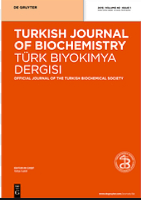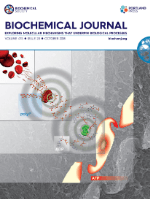
JOURNAL OF STEROID BIOCHEMISTRY AND MOLECULAR BIOLOGY
Scope & Guideline
Advancing the Frontiers of Steroid Science
Introduction
Aims and Scopes
- Steroid Biochemistry and Metabolism:
Research in this area involves the study of biochemical pathways related to steroid hormones, including their synthesis, metabolism, and the role of enzymes such as cytochrome P450 in steroidogenesis. - Hormonal Regulation and Disease:
This scope focuses on the impact of steroid hormones in various diseases, particularly cancers (e.g., breast and prostate cancer), metabolic disorders, and reproductive health issues. - Analytical Techniques in Steroid Research:
The journal emphasizes advancements in analytical techniques such as liquid chromatography-mass spectrometry (LC-MS/MS), which are crucial for quantifying steroid hormones and their metabolites in biological samples. - Endocrine Disruption and Environmental Factors:
Research addressing the effects of environmental chemicals and endocrine disruptors on steroid hormone function and metabolism is a key area of interest, particularly in relation to reproductive health. - Neurosteroids and Cognitive Functions:
Studies on the role of neuroactive steroids in the central nervous system and their implications for neuropsychiatric disorders and cognitive function are increasingly featured. - Clinical Applications and Therapeutics:
The journal explores the therapeutic potential of steroid hormones and their analogs in various clinical contexts, including hormone replacement therapies and cancer treatments.
Trending and Emerging
- Vitamin D and Its Metabolites:
Research on vitamin D, its metabolites, and their diverse roles in health, including immune function and disease prevention, has gained considerable attention, reflecting a broader interest in the implications of vitamin D deficiency. - Steroid Hormones in Cancer Therapy:
An increasing number of studies are exploring the role of steroid hormones in cancer treatment, particularly the development of novel therapeutic agents targeting steroid receptors in hormone-dependent tumors. - Neuroactive Steroids and Mental Health:
There is a growing focus on neuroactive steroids and their impact on mental health conditions, indicating an emerging interest in the links between steroid hormones and neuropsychiatric disorders. - Metabolomics and Personalized Medicine:
The application of metabolomics to understand individual variations in steroid metabolism and its implications for personalized medicine is a rapidly expanding area of research. - Endocrine Disruption and Public Health:
Research addressing the effects of endocrine disruptors on human health, particularly in relation to reproductive and metabolic disorders, has gained momentum, highlighting the intersection of environmental science and steroid biochemistry.
Declining or Waning
- Basic Steroid Biochemistry:
There has been a noticeable decrease in publications focusing solely on the fundamental aspects of steroid biochemistry without clinical or applied context, possibly due to the increasing complexity and translational nature of steroid research. - Historical Perspectives on Steroids:
Papers reflecting on historical developments in steroid research or retrospective analyses have become less frequent, as the focus shifts towards contemporary issues and innovative methodologies. - Plant Steroids and Phytochemistry:
Research on plant-derived steroids and their potential applications has waned, as more attention is directed towards synthetic and semi-synthetic steroid compounds with targeted therapeutic effects. - Animal Models in Steroid Research:
There seems to be a reduced emphasis on studies utilizing traditional animal models for steroid research, potentially due to the rise of in vitro and computational models that offer more direct insights into human physiology.
Similar Journals

IUBMB LIFE is a prestigious, peer-reviewed journal published by WILEY, dedicated to advancing the fields of biochemistry, molecular biology, and cell biology. With an impressive impact factor and consistently ranked in the Q1 and Q2 categories across multiple relevant disciplines—including Biochemistry, Genetics, and Clinical Biochemistry—this journal has established itself as a leading platform for disseminating innovative research and critical reviews that propel scientific discovery. The journal spans a converged publication period from 1999 to 2024, providing comprehensive insights into the dynamic landscape of biochemical research. Researchers, professionals, and students alike are invited to explore its Open Access options, ensuring that groundbreaking studies are accessible to a global audience. As it continues to shape the future of life sciences, IUBMB LIFE remains a vital resource for those seeking to enrich their understanding and contribute to these rapidly evolving fields.

Forensic Toxicology
Exploring the Intersection of Toxicology and Forensic MedicineForensic Toxicology is a premier journal published by Springer, renowned for delivering cutting-edge research in the realms of toxicology, biochemistry, and forensic medicine. With an ISSN of 1860-8965 and an E-ISSN of 1860-8973, this journal has established itself as a significant resource for professionals, researchers, and students engaged in the analysis of toxic substances within a forensic context. Its impressive impact factor and ranking reveal its influential presence in the field, particularly as it is categorized in Q1 for Pathology and Forensic Medicine and Q2 for Biochemistry (Medical) and Toxicology. Featured articles span a wide array of topics, facilitating interdisciplinary collaboration and advancing scientific knowledge. While currently not an open-access journal, it remains accessible through institutional subscriptions. With a convergence span from 2006 to 2024, Forensic Toxicology is committed to publishing high-quality research that enhances the understanding of toxicological phenomena and their implications in forensic investigations, reinforcing its role as an indispensable resource in the scientific community.

Turkish Journal of Biochemistry-Turk Biyokimya Dergisi
Exploring the frontiers of molecular biology and biochemistry.Turkish Journal of Biochemistry-Turk Biyokimya Dergisi, published by WALTER DE GRUYTER GMBH, is a pivotal open-access journal in the field of biochemistry that serves as a forum for innovative research and scholarly discourse. Since its inception in 2009 and transitioning to open access in 2015, this journal has gained recognition within the scientific community, reflecting a commitment to advancing knowledge in biochemistry and related medical sciences. With a diverse scope that encompasses molecular biology, clinical biochemistry, and the broader arena of biochemical studies, Turkish Journal of Biochemistry offers researchers, professionals, and students access to impactful studies and current developments. Although currently positioned in the lower quartiles in specific categories, the journal aims to enhance its visibility and engagement as it converges towards a promising future, fostering collaboration and knowledge exchange among biochemists across Turkey and around the globe. This journal is vital for anyone seeking to stay abreast of emerging trends and research findings in biochemistry.

Journal of the Endocrine Society
Unlocking the science of hormones for a healthier tomorrow.Journal of the Endocrine Society, published by the ENDOCRINE SOC, stands as a prominent platform for disseminating significant research and findings within the field of endocrinology, diabetes, and metabolism. Established as an Open Access journal since 2017, it aims to increase the visibility and accessibility of vital scholarly contributions, allowing researchers and professionals from various backgrounds to engage with the latest insights in this rapidly evolving discipline. With an impressive Q2 ranking in Endocrinology, Diabetes and Metabolism, the journal is recognized for its impact, ranking #100 out of 244 in Scopus, highlighting its role in advancing scientific knowledge and fostering innovation. The journal, based in the United States at 2055 L ST NW, SUITE 600, WASHINGTON, DC 20036, continues to enrich the academic landscape by converging state-of-the-art research and clinical applications through its publication cycle from 2017 to 2024. Researchers, students, and healthcare professionals are encouraged to explore this essential resource to stay at the forefront of endocrinological advancements.

BIOCHEMICAL JOURNAL
Navigating the Complexities of Life at the Molecular LevelBIOCHEMICAL JOURNAL, published by Portland Press Ltd, stands as a leading publication in the fields of Biochemistry, Cell Biology, and Molecular Biology, reflecting a commitment to advancing scientific knowledge since its inception in 1945. With a distinguished Q1 ranking across these categories and impressive Scopus rankings, the journal serves as an invaluable resource for researchers, professionals, and students alike, facilitating critical discoveries and innovative research practices. Although not currently offering open access, the journal provides a platform for high-quality peer-reviewed articles, ensuring rigorous standards in the dissemination of biochemical research. Spanning over seven decades and continuing through to 2024, the BIOCHEMICAL JOURNAL fosters an environment where cutting-edge biochemical research thrives, supporting the global scientific community's efforts to address complex biological questions and enhance our understanding of fundamental cellular processes.

BIOCHEMICAL AND BIOPHYSICAL RESEARCH COMMUNICATIONS
Connecting researchers through groundbreaking discoveries.BIOCHEMICAL AND BIOPHYSICAL RESEARCH COMMUNICATIONS, published by Academic Press Inc Elsevier Science, stands as a leading periodical in the fields of biochemistry, biophysics, cell biology, and molecular biology. With an ISSN of 0006-291X and an E-ISSN of 1090-2104, this esteemed journal has been a pivotal platform for the dissemination of groundbreaking research since its inception in 1959, continuing to publish influential findings through at least 2024. It holds a commendable Q2 ranking in Biochemistry and Q1 status in Biophysics as of 2023, reflecting its high impact and relevance in the field, supported by its strong Scopus rankings—ranking #43 in Biophysics and maintaining a presence in the top quartiles of several related categories. Although it is not an open-access journal, it provides critical insights and essential data that cater to researchers, professionals, and students keen on advancing their understanding of complex biochemical and biophysical processes. Its significant contributions to the scientific community underscore the importance of this journal as a reference point for innovative research and collaborative discourse.

International Journal of Endocrinology and Metabolism
Connecting Scholars to Shape Future EndocrinologyThe International Journal of Endocrinology and Metabolism is a leading peer-reviewed publication dedicated to advancing knowledge and research in the fields of endocrinology, diabetes, and metabolism. Published by BRIEFLAND in the Netherlands, this journal features original research, comprehensive reviews, and insightful clinical studies that explore the multifaceted aspects of hormonal disorders and metabolic conditions. With an impact factor that places it in the Q3 quartile category for 2023, the journal serves as a critical resource for academics and practitioners aiming to stay at the forefront of this dynamic field. Spanning from 2010 to 2024, the journal offers an enriching platform for innovative ideas and practices, fostering collaboration among scholars and healthcare professionals alike. Although not open access, the content is meticulously curated to ensure high-quality scientific discourse, positioning the International Journal of Endocrinology and Metabolism as an essential reference for those dedicated to improving health outcomes related to endocrine and metabolic disorders.

STEROIDS
Illuminating the role of steroids in health and disease.STEROIDS is a premier peer-reviewed journal published by Elsevier Science Inc. that has continuously contributed to the field of biochemistry, clinical biochemistry, endocrinology, molecular biology, and pharmacology since its inception in 1963. With a notable impact factor reflecting its quality research, STEROIDS is categorized as Q3 in several critical areas, including Biochemistry and Clinical Biochemistry, while achieving a Q2 ranking in Organic Chemistry. The journal serves as an essential resource for researchers, professionals, and students alike, disseminating groundbreaking findings related to steroid hormones and their physiological roles. This global platform facilitates access to significant advancements in chemical and biological sciences, thereby promoting a deeper understanding of steroid interactions and applications in health and disease. For further engagement, readers can access a wealth of knowledge to advance their studies and professional practices from this influential journal.

BIOLOGICAL CHEMISTRY
Pioneering Research in Clinical and Molecular BiochemistryBIOLOGICAL CHEMISTRY, published by WALTER DE GRUYTER GMBH, is a premier journal based in Germany focusing on the ever-evolving fields of Biochemistry, Clinical Biochemistry, and Molecular Biology. With a robust reputation reflected in its top quartile rankings (Q1) within both Biochemistry and Clinical Biochemistry categories, and a commendable Q2 ranking in Molecular Biology for 2023, this journal stands as a vital resource for researchers, professionals, and students alike. The journal spans a rich history dating back to 1881 and embraces contemporary scientific discourse, ensuring accessibility to critical findings and advances that shape the biological sciences. Although it is not an open-access journal, its impactful contributions and relevant insights continue to serve the academic community. With its ISSN 1431-6730 and E-ISSN 1437-4315, BIOLOGICAL CHEMISTRY remains committed to fostering a deeper understanding of chemical processes in biological systems, driving innovation and research excellence into the future.

BIOCHIMICA ET BIOPHYSICA ACTA-GENERAL SUBJECTS
Illuminating the Pathways of Life Sciences ResearchBIOCHIMICA ET BIOPHYSICA ACTA-GENERAL SUBJECTS, published by Elsevier, serves as a pivotal journal in the fields of biochemistry and biophysics, with a long-standing history dating back to 1956. This esteemed publication, bearing the ISSN 0304-4165 and E-ISSN 1872-8006, continuously contributes to advancing our understanding of complex biological processes through rigorous research articles and reviews. It notably holds a distinguished position with a Q2 classification in Biochemistry and a Q1 ranking in Biophysics for 2023, reflecting its high relevance and impact within these scientific domains. The journal is also recognized within the Scopus metrics, taking a rank of #40 out of 152 in Biophysics and #173 out of 438 in Biochemistry, thus placing it in the 74th and 60th percentiles respectively. Academics and professionals in the life sciences will find this journal an essential resource for current research, cutting-edge techniques, and comprehensive reviews aimed at enhancing the understanding of biological functions. While BIOCHIMICA ET BIOPHYSICA ACTA is not an open-access journal, it remains a cornerstone publication for those seeking to stay at the forefront of biochemical and biophysical research.